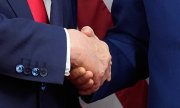Trump and Xi strike a deal in trade dispute
At their meeting in South Korea, Chinese President Xi Jinping and US President Donald Trump have agreed on several compromises in the trade dispute. While Trump says the dispute is now 'settled', Xi was more cautious and called for further consultations to reach tangible results regarding rare earths, agricultural imports and tariffs, among other things. What does the trial of strength between the two superpowers mean for the international order?
Both sides pushing for global power
This summit was just a footnote in the ongoing conflict of the 21st century, writes political scientist Nuno Severiano Teixeira in Público:
“The success of the summit will not change the nature of relations between the United States and China. The agreement will remain a transactional negotiation, not the beginning of institutionalised cooperation. It may ease economic tensions in the short term, which is a relief, but it will not resolve the long-term political rivalry. Because that is what this is really all about: a hegemonic rivalry for global leadership. A war between the dominant and the emerging power. Ultimately, this is about the transition of the world power structure into the 21st century.”
Forced to shift course
The trade war with China is becoming too expensive for Trump, Jutarnji list notes:
“Trump's U-turn is not based on partnership, cooperation or shared values, but on the realisation that open confrontation is too costly and that key US interests require dialogue. ... While most of the world has tried to woo Trump in order to secure lower tariffs, China responded with countermeasures. Until it became so unbearable for the Americans that they sat down at the negotiating table.”
Emerging markets are changing the rules
The balance of power between industrialised and emerging economies is changing for the long term, Le Soir observes:
“China is no longer willing to accept the subordinate position it was assigned in the context of globalisation. What's more, it has the means to resist - for example through export controls on rare earths. ... In the early 1970s these nations, which were referred to as 'developing' or even 'third world' countries, were already calling for a new international economic order. At the time, the industrialised countries could simply laugh off this demand. Today this is no longer the case. And in its desire to rewrite the rules Beijing has allies - within the BRICS group, whose economic power is steadily growing.”

